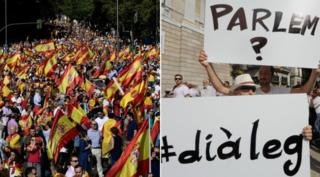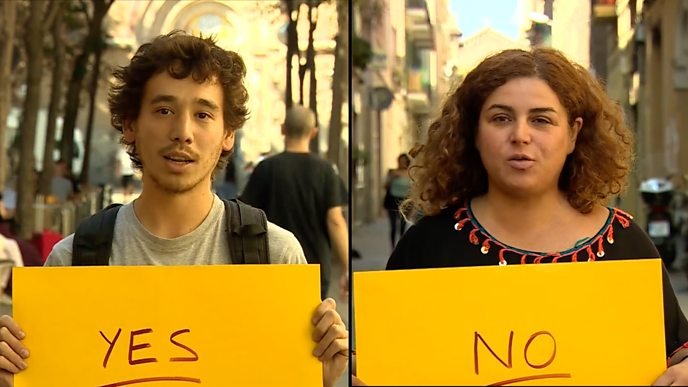
Pro-unity rallies are under way in the Spanish capital after Sunday's disputed referendum for Catalan independence.
Tens of thousands have protested in Madrid, while other demonstrations have been held in the Catalan city of Barcelona urging political dialogue.
Campaigners gathered with signs saying "Spain is better than its leaders" and "let's talk".
Businesses have continued to announce their departure from the Catalan region amid the ongoing political uncertainty.
The Caixa Foundation, which controls one of the Spain's largest banks, announced it was moving its headquarters to Palma de Mallorca while the crisis continues.

The country is waiting for a speech on Tuesday by Catalan President Carles Puigdemont amid speculation he will declare independence.
The final results showed 90% of the 2.3 million people who voted backed independence. Turnout was 43%.
What are the latest developments?
Spain's government representative in Catalonia apologised on Friday to people hurt during police efforts to stop the referendum, but blamed the Catalan government for holding an illegal vote.
Enric Millo said he could not help but "regret it and apologise on behalf of the officers that intervened".
Spain eases firms' exit from Catalonia
Distressed police officer photo goes viral
Does Catalonia want to leave Spain?
Nearly 900 people were injured as police, trying to enforce a Spanish court ban on the vote, attempted to seize ballot boxes and disperse voters. Thirty-three police officers were also hurt.
The Spanish government's official spokesperson, Iñigo Méndez de Vigo, also apologised for the police violence and suggested that new elections in Catalonia might be a way to heal the fracture caused by the disputed referendum.
Catalan President Carles Puigdemont is expected to address the Catalan parliament on Tuesday at 18:00 local time (16:00 GMT) after Spain's Constitutional Court earlier suspended the Catalan parliament session that had been planned for Monday.
There is speculation that the parliament will declare independence unilaterally at its next sitting.
There have been several claims of irregularities, and many ballot boxes were seized by the Spanish police.
Meanwhile, the former leader of Catalonia, Artur Mas, told the Financial Times newspaper that the region was not yet ready for real independence - even though he believed it had won the right to break away.
Stepping back from the brink?
By BBC's James Reynolds, Alicante
The competing authorities in Barcelona and Madrid could each take a potentially dramatic step.
Barcelona has the option of making a unilateral declaration of independence. For its part, Madrid has the power to dissolve self-rule in Catalonia. Each step - if taken - would provoke a constitutional crisis in Spain.
There are some signs that each side may choose to pause. Mr Puigdemont says he will deliver a report to the Catalan parliament on Tuesday about the political situation - a deliberately vague form of words which gives him room for manoeuvre.
More on the Catalan crisis
The man who wants to break up Spain
Catalonia media reflects polarisation
Analysis: Biggest crisis for a generation
Could Catalonia make a success of independence?
In other developments:
The Spanish cabinet issued a decree to make it easier for companies to relocate their legal headquarters away from Catalonia as major firms continue to announce relocations
The Catalan chief of police, Josep Lluis Trapero, appeared before a judge in a national criminal court in Madrid on Friday on suspicion of sedition against the state. He denied that his Mossos d'Esquadra force had deliberately failed to help Guardia Civil police tackle pro-independence protesters in the run-up to the referendum
So now they want to talk. Keep on fighting for freedom, for a free Catalonia!
Yes
Hi! I am a robot. I just upvoted you! I found similar content that readers might be interested in:
http://www.bbc.co.uk/news/world-europe-41533587
Yes
ok